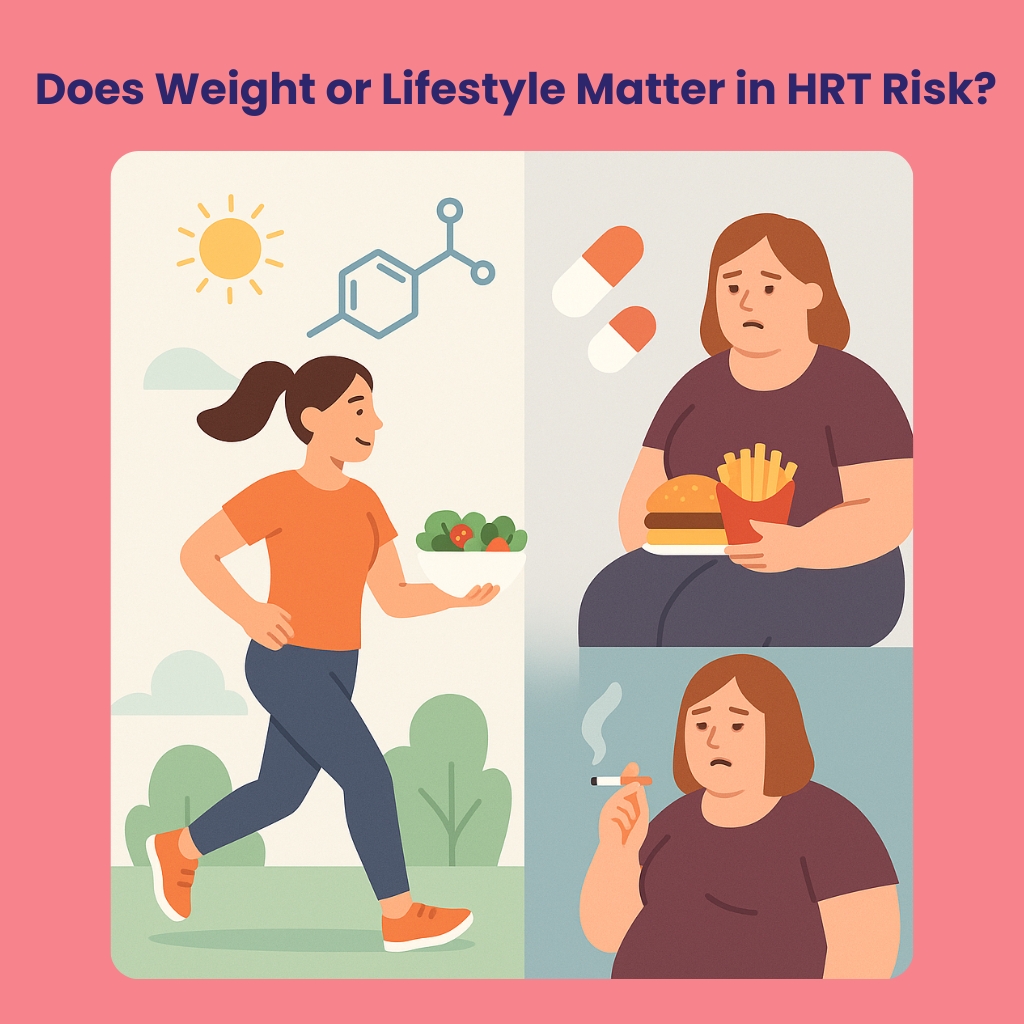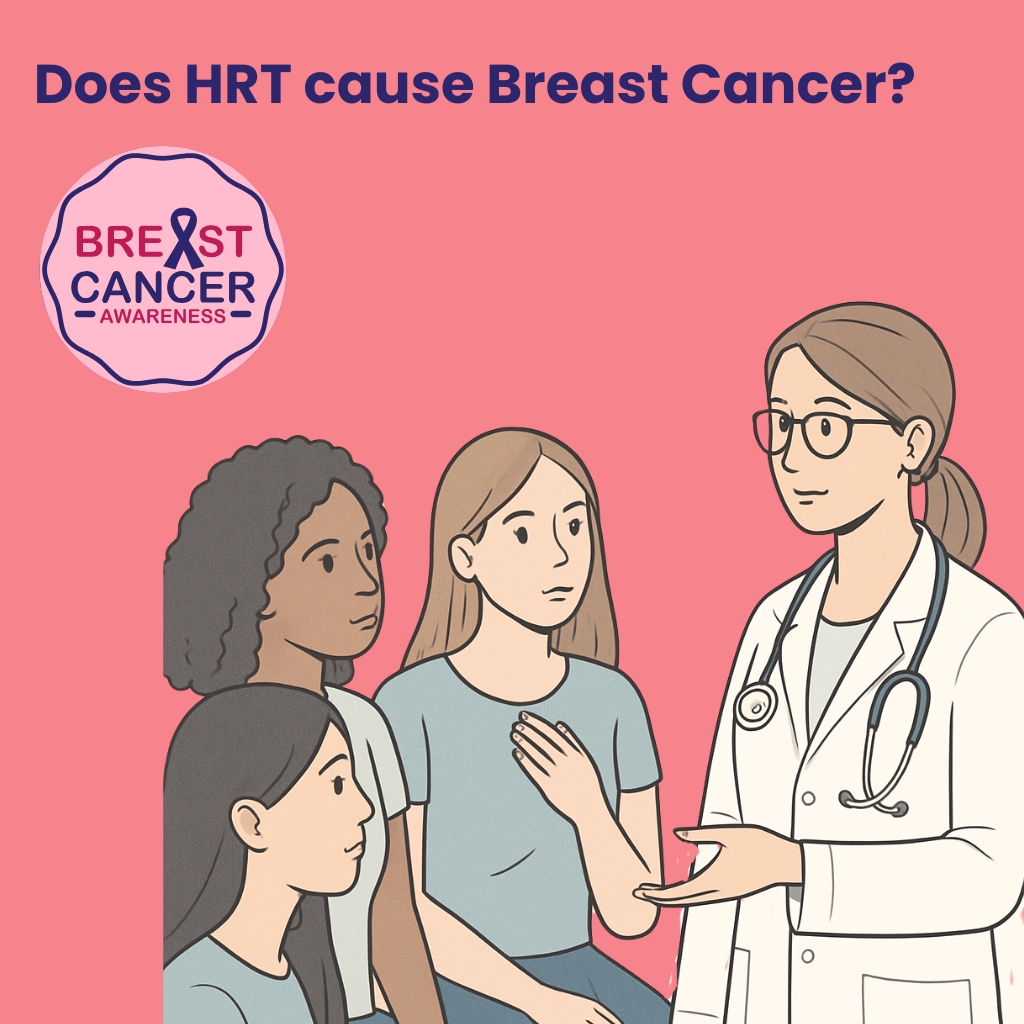If you’re navigating the ups and downs of menopause, chances are you’ve heard about hormone replacement therapy. From hot flushes and night sweats to mood swings and sleep disruption, menopause can turn your daily life inside out. That’s where HRT treatment often comes into the picture.
But while HRT can bring welcome relief, there’s one pressing question many Indian women are asking: does HRT cause breast cancer?
It’s a fair question, and not an easy one. The truth is that not all HRT is the same, and the risk varies depending on several factors like the type of therapy, your age, how long you use it, and your personal medical history.
In this guide, we’ll go through what science tells us about HRT and breast cancer, and break things down in a way that’s practical and easy to follow. Whether you’re already on HRT or just weighing your options, this article is here to give you clarity without the fear.
What is HRT and Why is it Used?
Let’s start with the basics. The full form of HRT is Hormone Replacement Therapy. It’s commonly prescribed to women who are going through or have completed menopause. Menopause often brings about a drop in oestrogen and progesterone levels, leading to symptoms like:
- Hot flushes
- Night sweats
- Vaginal dryness
- Bone thinning
- Mood changes
- Poor sleep
By replacing these hormones, HRT treatment helps manage these symptoms and improves quality of life.
There are two main types:
- Combined HRT: Contains both oestrogen and a progestin. This is usually prescribed to women who still have their uterus.
- Oestrogen-only HRT: Recommended for women who’ve had a hysterectomy.
Many women in India are now seeking options through a menopause specialist, especially in cities like Mumbai, where clinics such as Harleys cosmetic and women’s clinic provide support.
Is There a Link Between HRT and Breast Cancer?
This is the part that often causes the most concern, and rightly so. We’ll look at what research tells us.
Large studies like the Women’s Health Initiative (WHI) and the Million Women Study have investigated how HRT relates to breast cancer risk. Here’s what they found:
- Combined HRT (oestrogen + progestin) can increase the risk of breast cancer, especially when taken for longer than 3 to 5 years.
- Estrogen-only HRT carries a much lower risk, and in some studies, it has not shown any increased risk at all.
To give this some real-world context:
Out of 1000 women aged 50 to 59 using combined HRT for 5 years, about 5 to 7 more might develop breast cancer compared to those not on HRT.
But the risk starts to go down again once you stop taking it.
Important: There is no evidence that HRT causes breast cancer in every woman. It slightly increases the chance that someone might develop it. That’s a big difference.
Who Is More Likely To Face Increased Risk?
Not everyone who takes HRT treatment faces the same level of risk. Several factors come into play.
- Type of HRT: Combined HRT has a higher association with breast cancer risk. Estrogen-only HRT is considered safer, especially for women post-hysterectomy.
- How long you use it: Risk increases with long-term use (typically more than 5 years).
- When you start: Starting HRT in your late 50s or 60s may carry more risk than starting earlier.
- Body mass index (BMI): Women with lower BMI may see a more noticeable increase in relative risk.
- Family or personal history of breast cancer: This group should speak to a female hormone specialist before using systemic HRT.
This is why an open and regular conversation with your menopause doctor near me is essential.
Estrogen-Only HRT – Is It Safer?
For women who’ve had a hysterectomy, oestrogen-only HRT is often the recommended option. This is because there’s no need to add a progestin to protect the uterus.
And when it comes to breast cancer risk, the data is a bit more reassuring:
- Oestrogen-only HRT seems to carry a lower risk of breast cancer compared to combined HRT.
- In some studies, women using oestrogen-only therapy even had a slightly lower risk than those not using HRT at all.
Still, it’s not risk-free. Regular screenings and medical reviews are essential.
If you’re in Mumbai, consulting a trusted provider like Dr. Shilpa, a well-known menopause specialist in Mumbai, can be a valuable step.
How Long is Too Long? The Role of Duration in HRT Safety
Duration matters. The longer you stay on HRT, the more the risk of breast cancer builds.
Experts generally suggest:
- Short-term use (under five years) carries less risk
- Beyond five years, especially with combined HRT, the risk grows
- The risk starts to decrease again once therapy stops
This doesn’t mean there’s a strict cut-off. Some women may need HRT for longer. What matters is regular check-ins with your doctor. Reassess every year to see if it still makes sense for you.
Does Weight or Lifestyle Matter in HRT Risk?

Absolutely. Lifestyle can affect both your risk from HRT and your overall breast cancer risk.
Here’s how:
- Women with low BMI tend to have a higher relative increase in risk from HRT
- Drinking alcohol can add to the risk
- Regular exercise and a healthy diet may help reduce risk
- Smoking also compounds breast cancer risk
This means that even if you use HRT, healthy habits can make a difference. It’s not just about the medicine. It’s about your whole health profile.
What Are the Safer Alternatives to HRT?
Not everyone wants or needs hormone therapy for menopause. If you’re looking for other ways to ease symptoms, there are options:
- Non-hormonal medications: Like SSRIs or clonidine for hot flushes
- Cognitive behavioural therapy (CBT): Shown to help with mood and sleep
- Lifestyle changes: Exercise, diet, yoga, stress management
- Supplements: Some women try herbal remedies, but use caution and consult a doctor
Remember, these may not work for everyone. But they’re worth discussing with a healthcare provider.
Talking to Your Doctor: Questions to Ask Before Starting HRT
Walking into a consultation with the right questions can make all the difference. Here are a few things you might want to ask:
- Do I need combined or oestrogen-only HRT?
- What are the risks in my specific case?
- How often should I get screenings?
- Can I start on a low dose and see how it goes?
- What are the HRT therapy cost ranges in India?
Finding a trusted menopause doctor near me or consulting at Harleys cosmetic and women’s clinic may help you get answers that match your health profile.
FAQs
Q1. Can HRT cause breast cancer if used for a short time?
Answer: Short-term use of HRT, particularly under five years, carries a lower risk. It’s often considered acceptable when symptoms are severe.
Q2. Is it safe to use HRT after a hysterectomy?
Answer: Yes. Women who’ve had a hysterectomy are often prescribed oestrogen-only HRT, which has a lower breast cancer risk.
Q3. What kind of HRT increases cancer risk?
Answer: Combined HRT (oestrogen and progestin) is linked to a higher risk than oestrogen-only therapy.
Q4. How soon does the risk go away after stopping HRT?
Answer: The risk begins to decline after stopping, usually returning to baseline within a few years.
Q5. Are natural or bioidentical hormones safer?
Answer: There’s limited evidence showing bioidentical hormones are safer. Always consult your doctor.
Q6. Can I take HRT if my mother had breast cancer?
Answer: Probably not. A family history of breast cancer often makes HRT less advisable. Discuss thoroughly with your doctor.
Q7. How do I know if I need combined or estrogen-only HRT?
Answer: If you’ve had a hysterectomy, you may only need oestrogen. Otherwise, combined HRT may be recommended.
Q8. Is HRT safe after the age of 60?
Answer: Risk increases with age, so it’s best to evaluate the benefits and risks carefully with your doctor.
Q9. What should I do if I want to stop HRT suddenly?
Answer: It’s usually better to taper down slowly under medical supervision.
Q10. Are there clinics or doctors I can trust for menopause advice?
Answer: Yes. You can consult a menopause specialist such as Dr. Shilpa or visit Harleys cosmetic and women’s clinic in Mumbai.
Conclusion
The decision to use hormone replacement therapy is personal, and it’s best made with reliable facts and medical guidance. While HRT can raise breast cancer risk under some conditions, it also brings meaningful relief from the discomforts of menopause.
What matters most is finding the right balance. That includes considering your medical history, type of HRT, length of use, and lifestyle habits.
Always talk openly with a menopause specialist before starting or stopping therapy. With the right advice and support, you can make choices that work for your health and your life.


